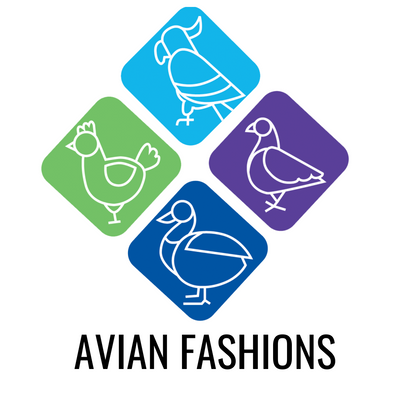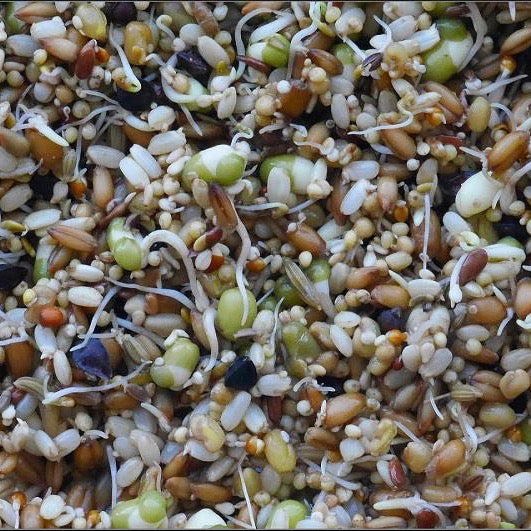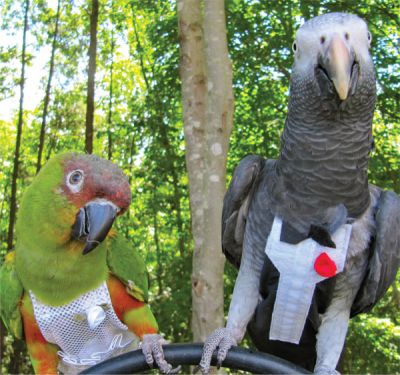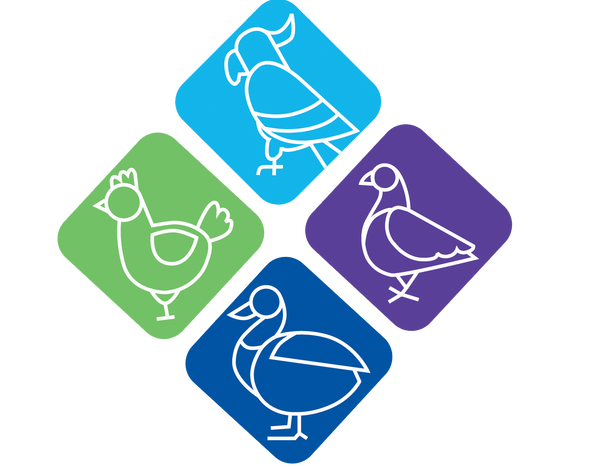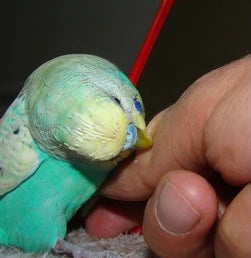
Bits About Biting
By Lori Pikkaart
We love our birds for so many reasons. Those cute faces … we can’t get enough of new things they say … we are helpless when they cuddle … and the way they interact with us is so charming. But they have their vices, too. When a pet bird bites, it brings up a flutter of emotions – hurt, anger, disbelief, betrayal. The emotional pain is often worse than the physical pain of the bite itself. To figure out the cause of the biting, we need to ask a few important questions.
- Has anything changed in the bird’s environment? This could be literally anything! Birds are extremely perceptive and notice every little detail. They get frightened or even aggressive if something isn’t quite right. It could be a balloon, a new nail polish color, a brightly patterned pair of slippers, new glasses, different hairstyle, the crinkle of a bag, or even a shirt color the bird abhors. My conures will always spot tiny bugs or shiny reflections on the ceiling and freak out.
- Is it springtime or breeding season? If the biting could be hormone-related, be prepared for the behavior to last up to a few months. The bird is reacting more to the hormones in its body than thinking rationally. Be sure to re-check our hormone blog for mitigation strategies. Note also that birds are territorial and more likely to bite around their cages or other spots they frequent – even favorite humans.
- Are the bird’s needs being met? Consider whether your bird is eating a healthy and balanced diet, keeping good sleeping habits, receiving regular baths, and getting the right amount of attention – not too much or too little. Perhaps your schedule has made you busier, or conversely, the bird has become over-stimulated with too much attention, activity, or noise in the house. Also, a bird may bite to tell you no, such as when you might ask him to step up but he’s perfectly happy where he is.
- What is your mood? Scientists are still learning new things about our birds’ amazing senses, and most bird owners will attest that their feathered buds have a sixth sense and are scarily in tune with their parronts’ moods. Specifically, if you’re in a bad mood or stressed out, your bird might have a negative reaction. I vividly recall when we were in the process of moving – the house was in chaos, there were endless boxes to pack and I was strung out. While waiting for the movers to arrive, I put my finger in my cherry-headed conure Charlie’s cage to scratch her head. Normally she’d acquiesce with a fluffy head, but this time she sensed my harried emotions which made her feel more threatened than affectionate, so she gave me the worst bite of our lives together.
- Is the bird a baby? Depending on the species, a larger bird is a baby until it’s almost two years old. Baby birds use their beaks to explore physical and emotional boundaries. New bird owners would be wise to know that birds use their beaks to climb and to explore their worlds, so they may reach out beak first to taste or touch something.
Be Practical and Tactical
The best way to stop biting is to prevent it. Once you have a good idea of why the bird might be biting, do your best to adjust their environment, keeping those biting planets from aligning.
- Watch your bird’s body language. If you see a bite coming, distract by removing the bird from the situation. You can use a dowel or scoop the bird up in a non-threatening, safe way in what I call the Towel of Correction to keep your hands whole while moving the bird to a neutral location.
- If the bird bites with intent, immediately tell her no, hold her as far away from you as possible, avoiding eye contact—even turning your back towards her—and place her on a distant perch or in her cage and leave the area for a time out. She understands this for two reasons: A) She knows that by using her own body language—the turning of the back—that you are displeased with her. B) She does not like being away from you, her flock member. She will quickly correlate that biting causes these two negative things to happen and may stop herself next time ... Unless it’s hormone-related—then she probably doesn’t have the luxury of “thinking;” she’s probably over-stimulated and simply needs a little time to decompress.
- Other tactics:
- Don’t react to the bite with yelling or drama. Some birds actually love dramatic reactions and thus, you might be unintentionally reinforcing the behavior.
- Be patient, consistent, and keep a routine that avoids biting situations. The less often they bite, the more likely the behavior will dissipate. Also, if your bird can’t be trusted on your shoulder, do not let him on your shoulder. Keep the bird in view.
- Give them opportunities to exercise their bodies and minds. There are so many wonderful ways to spend constructive time with them. You can coach them with parrot flight recall training, teach obstacle courses and tricks, or get involved with clicker or target training. Incorporate a daily training or talking routine that they can look forward to. Engaging them physically and mentally leaves less room for biting behavior and more room for a better relationship.
- Reward good behavior! Do not give them what they want when they exhibit bad behavior. If they try to bite while you ask them to step up, walk away. Then come back and try again. Or try again with a treat or favorite chew toy in hand. It takes discipline on our part to consistently promote positive change.
Above all, don’t take biting personally. The subject of biting is vast and complex, and this article merely touches on some basics. Tough cases may require a behavior consultant. The avian mind is complicated, intelligent, instinctive, and intuitive, and we flock to them for those qualities. Ultimately, our patience pays off – the avian heart wants to love and be loved.
Lori
Mama to a cheeky conure, serene budgie, and analytical canary
Leave a comment (all fields required)
Comments will be approved before showing up.
